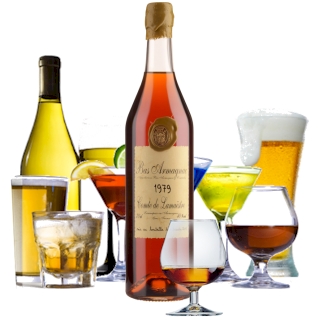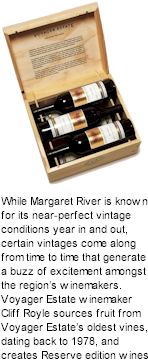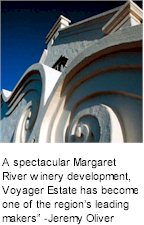


Voyager Estate began life as Freycinet Estate, its first vines being planted in 1978. When it became Voyager Estate in 1991, the first move was to expand the original 44 hectares by buying three adjoining properties, bringing the total area to 300 hectares. Over the next few years a program of extensive modernization and improvement was undertaken. Taking pride of place is a magnificent cellar sales building, constructed in the enduring South African Cape Dutch style of architecture. The choice of this handsome and functional style of architecture reminds visitors that the first vines planted in Western Australia in 1829 were introduced from South Africa. The expansive gardens are now maturing and transforming Voyager Estate into a place of singular tranquility and beauty.

Voyager Estate's oldest vines date back to 1978, just over 10 years after vines were first planted in the area. When current owner Michael Wright took over the property in 1991, he set out to expand it and develop a visitor destination that would be a showcase for the region. He also set out to ensure that, above all else, the quality of wine being made at Voyager Estate would always be the best that nature, expertise and pure hard work could provide.
Voyager Estate owner, Michael Wright is a third generation member of a family business that started with his grandfather in 1900. Michael’s father, Peter Wright, played a major role in the discovery and promotion of WA’s substantial iron ore industry and was, along with Lang Hancock, a founding member of the Hancock & Wright group. While the family is best known for its mining involvement, it also enjoys interests in agricultural, transport and publishing to name a few.
In the opinion of Voyager Estate Viticulturist, Steve James "There are a number of differences in viticultural techniques around the world, but the basic vineyard principles common to the best producers were terroir, minimal intervention and vine management." Voyager Estate follows the same path, with a minimal or no-input policy in terms of fertiliser, water and chemicals, and are employing more and more organic practices. Maximum vine management in terms of canopy maintenance is employed, aiming for low bud numbers and small bunches per vine for premium fruit quality. Clonal selection is also an area of increased attention, trying to match the best clones to the soil.

Whilst there will always be experimentation with new technologies, experience in both the Old World and the New has shown that the deepest expression of the vineyard is reliant on the basics. Adapting the traditional vineyard philosophies of the ancient winemaking world, is at the very heart of what makes Voyager Estate the quality that it is. According to Winemaker, Cliff Royle, Voyager Estate’s winemaking philosophy is simply to make the best wines we possibly can. Traditional methods are applied and the latest technology is utilised.
The winemaking process, however, begins in the vineyard. To ensure the best possible wines are produced, the winemakers work very closely with the viticultural team during the ripening period and harvest. On the whole, the best wines come from minimal winemaking intervention and allowing the fruit to speak for itself. "We make wines from the classic grape varieties that are suited to the Margaret River region, and we put as much effort into making a lighter-style wine such as Sauvignon Blanc Semillon as we do our Chardonnay," Cliff says.
In Cliff’s view, it is essential to respect the varietal characteristics of the fruit and so, when it comes to the use of oak, he is very careful not to overdo it. "The best fruit in the world can be ruined by heavy-handed or uncomplimentary oak usage. Careful oak integration is so important – we want to enhance the fruit, not overpower or spoil it." There is one final key component to good winemaking – people. On this point, Cliff is quite clear: "Have good staff, train them well and look after them". And we agree with him. After all, he is Winestate Magazine’s 2002/03 Australian Winemaker of the Year
